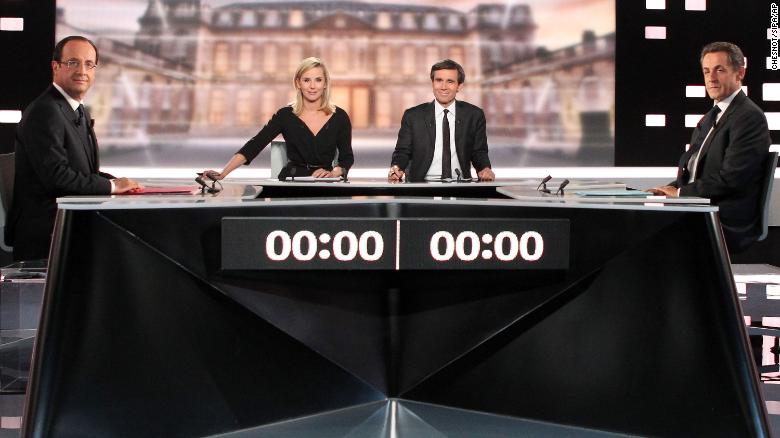Americans are on the eve of a momentous political choice this November. But for a jump on how the story goes from here, consider what happened in France, where another “back to normal” candidate challenged a firebrand incumbent.
Let me explain: I was born and raised in Paris, France and on the eve of the 2016 US presidential election, I relocated with my family to the southern state of Georgia for CNN International.
We were still unpacking our suitcases on election night, when the polls sent then-Democratic presidential nominee Hillary Clinton home and Republican nominee Donald Trump to the White House. And I had barely gotten behind the anchor desk by the time Trump spoke of “American carnage” in his inaugural address, setting the tone for his presidency.
In the years that followed, I had a front row seat as Trump took a wrecking ball to presidential norms. As I watched the endless presidential transgressions, unrelenting media coverage, and bitterness on both sides of the political divide, it started to feel… familiar.
It reminded me of France a decade earlier, where then-French President Nicolas Sarkozy had reveled in incensing liberals, dominating the headlines, and borrowing from the lexicon of the far-right.
To say the norms of presidential behavior were broken during his first term would be an understatement. Highlights of Sarkozy’s colorful conduct as president include him telling a hostile bystander, “get lost, asshole!” and egging a heckling fisherman to “come down and say it!” His post-election holiday on the private yacht of a French billionaire — a no-no in French politics — was never quite forgiven. And his controversial push to strip French nationality from foreign-born citizens who committed grave crimes never made it past parliament.
Of course, he is not Trump. Sarkozy is a conservative career politician who knew the affairs of state inside out. He didn’t make a habit of insulting political opponents, promote conspiracy theories, or alienate France’s closest allies. And he was chummy with US Democrats: In 2008, he embraced Barack Obama, then a senator vying for the Democratic nomination, in Paris; in 2016, he favored Democratic presidential nominee Hillary Clinton.
Sarkozy even tried to pump the brakes midway through his presidency. Following a rout in regional elections and a waning popularity, he softened his tone — to “presidentialize himself” as the French press described it. More in control, less erratic, less confrontational. “We need authenticity, not histrionics. I must be minimalist,” Sarkozy told French newspaper Le Journal du Dimanche, a year before his reelection bid.
But it was too late. And this is where the parallels matter most: After Sarkozy’s million-miles-an-hour presidency, France — like America now — was running on fumes. The country was exhausted. For many voters, the passions unleashed, the acrimony, the national soul-searching hadn’t been sustainable.
And Sarkozy’s raucous re-election campaign, like Trump’s today, did nothing to suggest a second term might offer something different. When your brand is firebrand, it’s hard to slow down. On all his signature issues, Sarkozy leaned in: Naked appeals to the far-right, a pledge to halve the flow of immigration because there were “too many foreigners in our country,” attacks on the media and diatribes against vague “intermediary bodies” impeding his government’s work.
His base loved it but it wasn’t enough.
In 2012, Sarkozy lost to socialist candidate François Hollande, an opponent so devoid of charisma he elicited the nickname “Mr. Normal.” Critics’ nicknames for him included “Flanby,” a gelatinous caramel desert for kids, and “Culbuto,” a tumbler toy which rolls in every direction.
The truth is that Nicolas Sarkozy beat himself. He was his own worst enemy. His approval rating clocked in at 36% one month before the election according to the IFOP polling institute, the worst ever for an incumbent at the time. His disapproval rating also set records, at 64%.
Hollande had only to ride the wave of anger against the incumbent. And that’s what he did: Asked during the French presidential debate what kind of president he would be, Hollande spent half of his three minutes detailing what he wouldn’t be: An anti-Sarkozy manifesto, widely considered the signature moment of the debate. Four days later, he was the president-elect.
Therein lies the lesson from France: After years of saturating the media, breaking cultural and political taboos, there comes a point when the politics of transgression stop working. Voters, after a while, have heard too much. And they hunger for “Mr. Normal.”
>>>details
